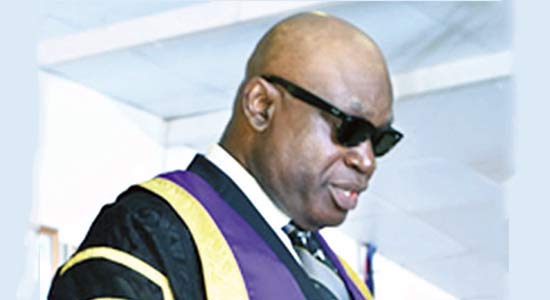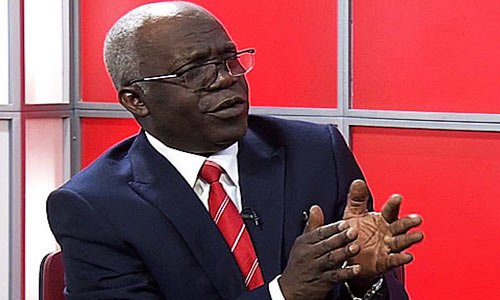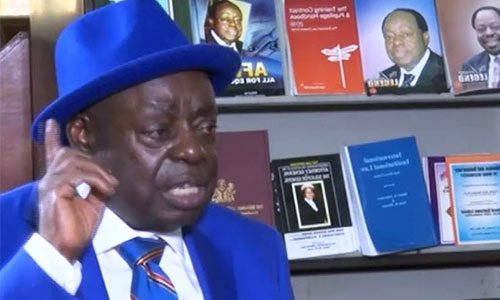Law Setting Up Council Legal Education Needs To Be Reviewed To Reflect Current Realities And Needs Of The Profession — Chief Emeka Ngige, SAN

The Chairman of the Council of Legal Education, Chief Emeka Ngige SAN has harped on the need for a review of the existing law which set up the Council of Legal Education as well as other bodies relevant to legal education in the country.
Delivering his goodwill message at the recently held Nigerian Bar Association Legal Education Summit hosted at Afe Babalola University, the Learned Silk commended the leadership of the Nigerian Bar Association for hosting the Summit at what he described as an “auspicious time”.
He stated that the NBA has taken its role as a major stakeholder in the legal education sector as provided under various laws in the country. He further stated that all members of the bar and bench today were once law students, and thus the quality of legal education in the country or otherwise will directly determine the quality of the legal profession.
“I especially commend the leadership and membership of the Nigerian Bar Association for putting together a summit of this nature at such an auspicious time, aimed to assist in advancing legal education in Nigeria. As we all are aware, the NBA is a major stakeholder in the legal education project in Nigeria. First, and pursuant to the provisions of section 2(1) (e) and (f) of Legal Education (Consolidation) Act, Cap L10 LFN 2004, the NBA President and 15 other NBA representatives are members of Council of Legal Education. Second, by virtue of Article 3 of the NBA Constitution, 2015, among the major objectives of the Nigerian Bar Association are promotion and advancement of Legal Education, Continuing Legal Education, Advocacy and Jurisprudence, and Promotion of co-operation between the NBA and other National Institutions. Such national institutions include the Council of Legal Education/Nigerian Law School, Universities and institutions engaged in legal education of aspirants to the Nigerian Bar. Third, most, if not all, law students in Nigeria will end up as Legal Practitioners and as such members of the NBA and of the legal profession in Nigeria; all members of the Bar and the Bench were at one time or another law students. By virtue of section 4(1)(a) of the NBA Constitution, all persons called to the Nigerian Bar and duly enrolled at the Supreme Court of Nigeria as legal practitioners are members of the NBA. Accordingly, progress or otherwise in legal education directly impacts the legal profession”
Going further, he stated that that legal education in the 21st century must be one that is tailored to efficiently address the fast-paced socio-economic and political transformations the world is undergoing. He also noted that legal education in Nigeria should be aimed at training and producing lawyers who would measure up to contemporary benchmarks and international best practices.
He noted; “legal education in the 21st century must be one that effectively responds to the economical, technological, and societal shifts that happen at an ever-increasing pace. It must be an education that sets children up to succeed in a world where more than half of the jobs they will have over their careers do not even exist yet (Sara Hallerman, Colon Lewis, and Brad Dresbach). Finally, as recommended by the New Teaching Curriculum in the Nigerian Law School, 21st century legal education in Nigeria is also aimed at producing lawyers who would be in a position to measure up to contemporary benchmarks and international best practices in the legal profession.”
Ngige in his message also commended collaborative efforts by the Council of Legal Education and the management of the Nigerian Law School to encourage practical training of aspirants to the Nigerian Bar to meet 21st century needs. He also lauded efforts by law teachers in the various faculties of law in the country for their contribution towards the academic, professional and personal development of lawyers in the country. He as well stressed that despite their laudable efforts, more needed to be done for legal education in the country to meet pressing needs and drastic societal shifts.
“I salute Law Teachers in the Law School, in the various law faculties and other other institutions that offer legal education in Nigeria. In their individual and collective capacities, Law Teachers in Nigeria have contributed towards the academic, professional and personal development of lawyers and law practice in Nigeria. However, a lot still needs to be done. Legal education needs to continually and consistently develop in order to remain relevant to the needs of a dynamic society. There is need for continuous and concerted efforts by all stakeholders at strengthening existing partnerships and collaboration with a view to improving on the quality of legal education. There is also a need for reorientation in our profession and there is no better place for this to start, than from the foundation, which is our legal education.”
Speaking on the recent move by the Senate to create additional law school campuses, the Council of Legal Education Chair berated the move describing it as a circumvention of the provisions of the law with respect to the management of the law schools in the countr. He said such decisions should be left exclusively for the Council of Legal Education and the Nigerian Law School management who deeply understand the needs and challenges facing legal education in the country.
“The decision of the Senate completely brushed aside opposing/contrary advice and views by the Honourable Attorney-General of the Federation, the Council of Legal Education, Nigerian Law School, the Nigerian Bar Association and other major stakeholders in the legal education sector in Nigeria. The extant law, the Legal Education (Consolidation) Act, in its section 1(2) and section 3 respectively confers on the Council of Legal Education the “responsibility for the legal education of persons seeking to become members of the legal profession” and for “Continuing Legal Education”. By the combined effect section 2(5) and section 4 of the Act, the Council may “do such things as it considers expedient for the purpose of performing its functions” subject to general directions by the Hon Attorney-General of the Federation. Thus, the dissenting advice and views of the Council, of the Hon AGF, of the NBA and of some other stakeholders were based mainly on the reasonable realisation that establishment of additional Campuses for the Nigerian Law School is better left in the hands of the Council in collaboration with the Nigerian Law School as administrative matters to be guided by expediency and need, among other factors. The Council of Legal Education, the Management of the Nigerian Law School, among other stakeholders, are better -placed to make/take decisions in this respect. There is an adage that “he who wears the shoes knows where it pinches”.”
In his concluding remarks, he hinted that the law setting up the Council of Legal Education needs to be reviewed to reflect current needs of the profession and the sector. He recognized the draft bill on Legal education sent to the Body of Benchers which seeks to establish a Council of Legal Education that will be separate from the Nigerian Law School and other private Law Schools to be established.
In conclusion, he extended his goodwill to all delegates at the summit and wished them a fruitful deliberation.



